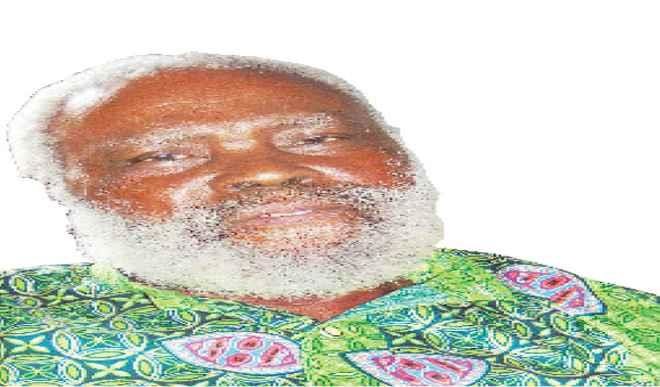Meet prof who owns 50,000 books, and counting
Ideas fascinate him. His house which is set a little off a quiet road, is the perfect setting for the growth of ideas. He has about one hundred and eighteen publications, which include articles and books, but this may be a conservative estimate, as it comes from a document prepared in 1992. He began to […]


Ideas fascinate him. His house which is set a little off a quiet road, is the perfect setting for the growth of ideas. He has about one hundred and eighteen publications, which include articles and books, but this may be a conservative estimate, as it comes from a document prepared in 1992. He began to keep books in the 1960s, when he left Idanre, Ondo state for Lagos. His house which is ringed by lovely hills made even lovelier by the June sunshine, is a book collectors paradise, a haven for bibliophiles one might say. This is the very heart of Akinde’s world, and his is a life partly inspired by books, and no wonder he has accumulated 50,000 of them, which he plans to donate to a university to be set up in the community. This will be a first for Idanre which cannot boast of any higher institution except for numerous secondary schools, he tells me. His robust CV indicates ‘Publishing, Research and Book Trading’, as his occupation. The reading of books moves a society forward, his life indicates. There is the rich emanation which you notice when you enter his house. Both old and new books emit a nice tang, which a lover of books would find enchanting, rather than repulsive. The endless row of books neatly arranged, even by colour throughout the parlour, delights the eye.
Imagine raising your head from a captivating novel to look upon these rolling hills of Idanre every day. Or to turn from gazing at the silent hills, to immerse yourself in a great work of art. There are books in every room and they cover a broad range of themes, including history, philosophy, mathematics, art, literature, physics, geography, and then there is the Encyclopedia Britannica. The parlour may be the biggest room in the house, and it is quite extensive. One can say that there is a book for every soul who passes through his doors. Dr. Charles Akinde, who can express himself in seven European languages and has lived and worked in an equal number of European countries, says that some years ago he lost many books to termites. This is the equivalent of an earthquake to a collector of books. On the walls of the room are pictures of his wife, a European, as well as those of his children. One of his sons appears to be in the army abroad.
The hills of Idanre excite him in much the same way as books do. One can say his is a life which is inspired by nature. He is a repository of folklore on the hills ‘We have many hills named after the heroes of Idanre. People don’t worship the hills, but they name the hills after their heroes such as Ilaran and Ojimaba. Our people use the hills to remember their heroes and heroines. We also have many other minor hills.’ He has a close connection with his community, and has been at the forefront of the effort to turn Idanre into a UNESCO World Heritage Site.
He can date exactly when his interest in books began ‘The passion for books started in 1960, effectively when I went to Lagos. While there I read newspapers on the lives of Awolowo, Azikiwe and Nkrumah, who all educated themselves through correspondence courses. I read a lot about all these great people. I determined that if the lives of these men was anything to go by, I also can improve myself. I was happy that I had made up my mind to go to Lagos.’ He joined the Nigeria Youth Congress which was being run by Dr. Tunji Otegbeye who was a medical doctor, and through this congress he was exposed to Pan Africanism. According to him ‘I fell in love with the theory that will make Africa independent, and I began to accumulate literature on the subject. This was also a time when Marxism-Leninism was being promoted. I was also attracted to many of these liberation struggles, knowing that that was the only way we could free ourselves. That was how I developed the idea and started to read. I was reading so much, but because I couldn’t attend school, I started to do correspondence courses.’ Later on he went abroad for further studies and this took him to seven European countries, including Germany, Denmark, France and Italy. Slowly and inevitably, his collection of books grew, and the abundance of bookshops in the cities in which he lived, was part of this. The range of his scholarship is large. He has degrees in Sociology and Political Science, Law, Business Administration, Commercial Art and Design, Journalism, Photography, Homeopathy and Natural Healing, Italian Language and Civilization, French Language and Civilization etc.
On ways to tackle the poor reading culture in the country, he argues ‘There should be community libraries and reading halls. Government should look into this, and encourage people to make use of the community libraries and information centres.’ He doesn’t think that making a donation of 50,000 books in a country where the reading culture is low is necessarily a contradiction. He would have none of that. Akinde, who is also the Osore of Idanre kingdom, has a friendly inspiring nature, which seems to gently urge every visitor to get a book to read.
